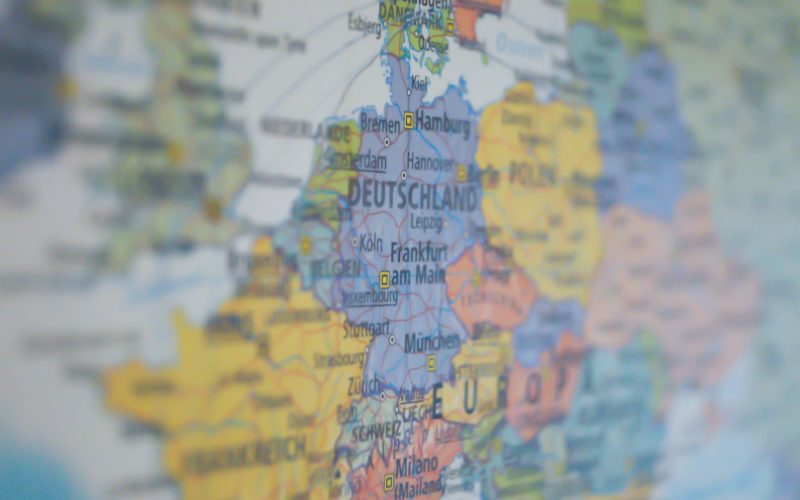Germany, the economic engine of Europe, has not only decidedly run out of steam, but its political system – long both admired and ridiculed for its blandness and predictability – is seemingly sinking into chaos. The country has been rocked by abysmal economic performance, a relentless train conductor strike and has seen the collapse of the political centre with the growth of the Alternative für Deutschland (AfD) party.
When the news broke that AfD back-benchers and junior members of the CDU met to discuss what the media dubbed a “master plan” to deport foreigners, Germans all over the country gathered in anti-far right protests. Berlin’s politicians, first and foremost those from the government, were quick to embrace the protesters and praised their democratic spirit. It was an all-too transparent attempt to ride a wave of solidarity spreading throughout society at a time of deep division and unhappiness with the Scholz government, betraying the fact that the protests came in handy for the German federal government as a distraction for German citizens from its own failures.
Indeed, Scholz is deeply unpopular among voters, recently receiving the lowest approval rating of a German chancellor since 1997. Apart from overseeing the country’s industrial decline and failure to rein in economic problems, his political flip-flopping has angered all strata of society, resulting in an explosive mix with potentially far-reaching implications at a time when the Ukraine war and transatlantic uncertainty demand German leadership more than ever. The cheap attempt to exploit people’s anti-fascist sentiments for sympathy is no excuse for bad politics.
Simply bad politics
While Scholz attempted to gather brownie points with the protesters, the segments of society that he has particularly angered have been unfazed by this. German farmers, just like their counterparts in France and the Netherlands, are expressing their anger with the government in far-reaching protests, deeming the financial burden placed upon them too heavy to manage. In France, farmers mobilised massively against the reform of taxation on agricultural diesel which provides from 2026 for the removal of an exemption from which the profession historically benefited. In the Netherlands, the ruling coalition’s desire to reduce the country’s livestock and close certain farms led to massive demonstrations by farmers. From these mobilizations was born the BoerBurgerBeweging party (BBB) which established itself as a real political force, notably winning the provincial elections in March 2023.
In Germany the proposed budgetary cuts would cost the sector about 1 billion EUR per year and due to already incredibly thin margins, this proposed cost could be the difference between life and death for many farms, driving countless farmers into bankruptcy. Ultimately, what these movements show is that across Europe, the tolerance for policy making which goes against the collective interest is increasingly low. Germany is not the first country to antagonise a vital part of its electoral community—but it is a cautionary tale that other EU governments should heed.
In the Netherlands, on October 1st, the country’s streets screeched to a halt. More than 2,000 tractors rendered the country immobile with more than 1,000km of traffic. The farmers had gathered to protest against the announcement from a member of the advisory committee that had declared that the Dutch government would need to embark on “drastic measures” to reduce emissions of nitrogen. The plan is indeed dramatic: the European Commission announced that it had approved two Dutch plans worth 1.47 billion euros to buy out livestock farmers to reduce nitrogen pollution. Permissible under state aid rules, the Netherlands plans to compensate farmers who voluntarily close their farms near nature reserves. The country has set the target of halving nitrogen emissions by 2030–to do this, one-third of cattle farms will need to be closed between now and then.
A microcosm of Europe’s failed rinse-and-repeat strategies
Meanwhile, policymaking at the EU level has not fared any better in terms of public acceptance. A pertinent example of the consequences of poor policymaking being passed on to the consumer goes from the farm to the grocery store—the proposed Front of Package (FOP) nutritional label. Brussels is trying to move towards harmonisation of these labels, but there’s no clear frontrunner–the France-developed label Nutri-Score, for example, has been adopted by several member states yet has faced relentless criticism since its inception.
Despite its purported aim to support healthy eating by giving foods a letter grade from A-E as well as a colour from green to red, Nutri-Score has repeatedly been called out as counterproductive. The continuous and mounting criticism about the lack of logic and scientific reasoning behind Nutri-Score’s grading algorithm has caused the label to be in its 3rd iteration. Unfortunately, the current iteration does little to assuage perennial concerns, and some European countries have even banned the label, categorising it as “misleading” to consumers.
It’s not just food labelling policy which is proving to be problematic on a European level but also food packaging. In November, Brussels was ridiculed for its Proposed EU Recycling law which shot itself in the foot when going after those one should never go after – the French cheesemakers. The proposed recycling law would have made it impossible for non-AOP camemberts to be sold in their iconic wooden boxes. The wooden boxes, while a visual calling card of camembert, also serve a functional purpose. Not only does the box offer structural support which prevents the cheese from collapsing during transport, but it also helps with the ageing process. If the iconic wooden packaging had been banned, experts warned, thousands of agri-food jobs could have been at risk.
Writing on the wall
These kinds of policy missteps mean that it’s no surprise that many European citizens are feeling deeply antagonised by national and EU politics, in what is a stark sign that Brussels, Paris, Berlin and others have done a poor job of convincing both farmers, consumers and citizens that their policy agendas are aligned with the needs and desires of everyday Europeans. In an election year, it’s worth taking the time for those who propose policy on our behalf to reflect on how to legislate on what is actually important to Europeans.
The cost of inaction on any of the policy fronts currently stirring Europeans – be it agriculture, cost of living, European security and support for Ukraine, or immigration – is difficult to fathom. But it’s clear it would cause epochal changes across European societies – which is why the fact that politicians seemingly gaze unflinchingly into the face of disaster is all the more incomprehensible.









